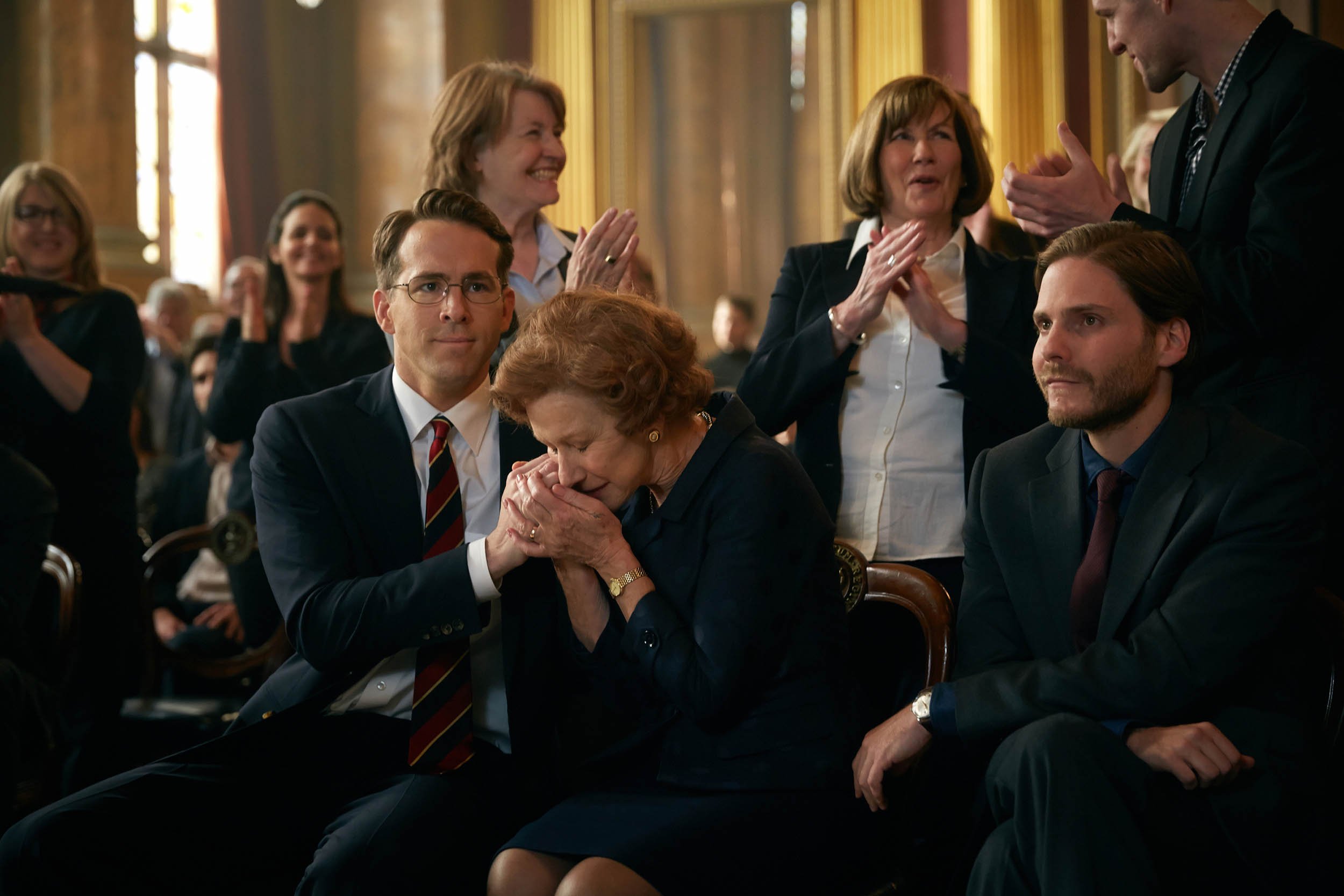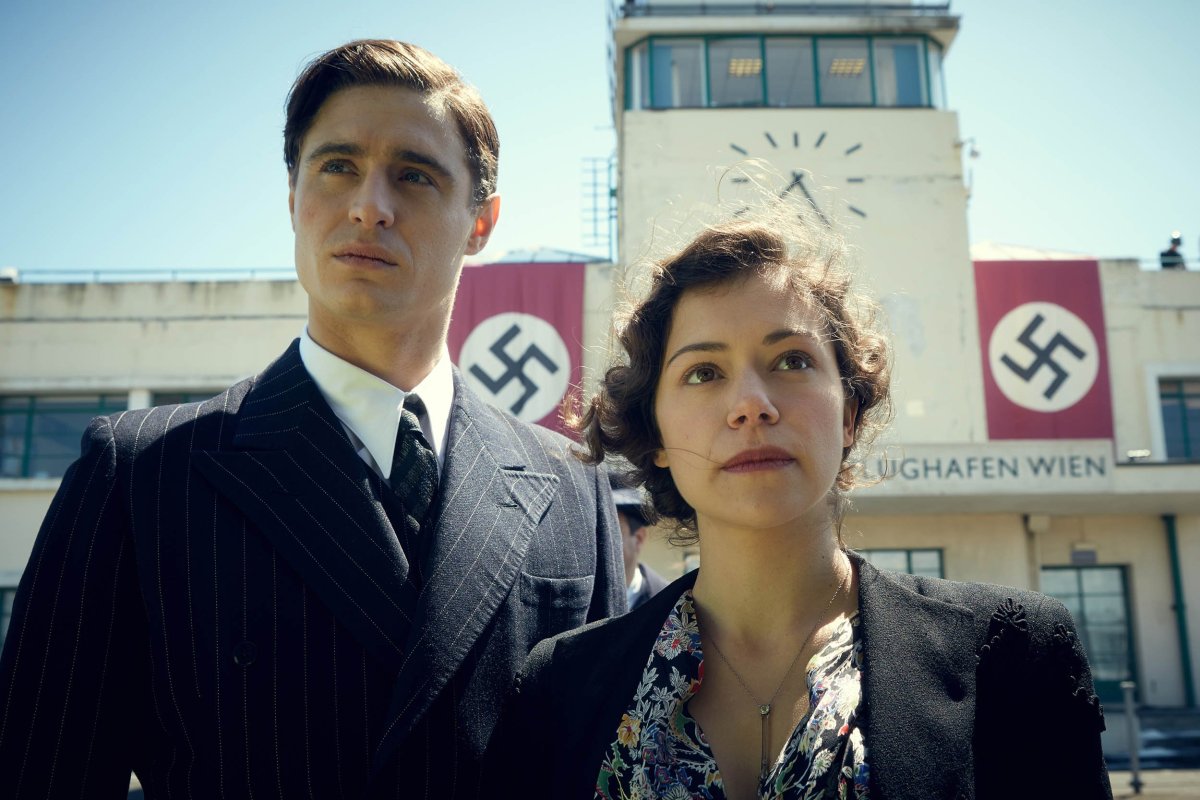
Updated | Many of us have a keepsake of our family's history, a photo or painting perhaps, that could tell us something about our lineage—if only we could understand what it was saying. For Helen Mirren it was a cache of letters, written to her grandfather from his sisters back in Russia. "I didn't lose my grandparents' generation," she says, unlike the character she plays in Woman in Gold, Maria Altmann, who lost much of her family to the Holocaust. "They survived the Russian Revolution and the Second World War, which was a miracle, and they survived Stalin, which was an even bigger miracle. But their whole land and history was taken away from them."
The letters, "in little spindly Russian writing," were bequeathed to her after her parents died and it wasn't until Mirren was starring in the great British crime series Prime Suspect that an Englishman on set who was fluent in Russian offered to translate them, "and it was like a curtain lifting, knowing the names of my great aunts, knowing their personalities, their characters. Finding out where my great grandmother was buried…" After the Soviet Union collapsed, the Academy Award-winning actress traveled to Russia with her sister, found the letters her grandfather had written to his sisters and mother, and met many long-lost relations. "They were quite suspicious," she recalls, speaking to me from New York, where she is appearing again as the queen of England in The Audience on Broadway. "'Who are these weird people coming from Great Britain? Are they really who they say they are?'"
Altmann's problem was a little more complicated. The family heirloom she had been separated from was a painting of her aunt, Adele Bloch-Bauer, that Gustav Klimt painted in 1907. It was one of the many works of art the Nazis stole, and because her aunt had asked that it be left to the Austrian State Gallery before she died of meningitis in 1925, the current government was unwilling to part with it. (The will was ultimately proved invalid, since her husband who commissioned the portrait was the owner of the painting after her death.) "It's hard to describe how important that picture had become to Vienna," says Mirren. "It literally had become one of their main tourist attractions. You went to Vienna, you had your coffee, you went to the opera and you went to see the Klimt." Or, as a lawyer says in the film, "You think a painting that ends up as a refrigerator magnet will ever leave Austria?"
Which is why Altmann, who had settled in Los Angeles by the late '90s when the story begins, engaged the services of attorney Randy Schoenberg (played in slightly nebbishy fashion by Green Lantern star Ryan Reynolds), the son of her best friend, whose family also had ties to Vienna. (His grandfather was the composer Arnold Schoenberg, who escaped to the United States after the Nazis declared his music degenerate.) He had been to Vienna as a boy and seen the portrait (once called simply Woman in Gold by the Germans, hoping to obscure its provenance) but had no idea of its history.
This was the beginning of Schoenberg's interest in art restitution cases and his relationship with Altmann, who he got to know well in the eight years that the case (the Republic of Austria v. Altmann) dragged through the courts. "There was a real transformation I underwent in the eight years where I got more and more involved and interested in my own family history," says Schoenberg. In the film, that awakening culminates in a scene in which he weeps at a Holocaust memorial unveiling upon seeing the name of his great-grandfather, murdered at Treblinka.
"One reviewer used the word 'Weinsteined' [about the scene] when Ryan Reynolds goes and cries," says Schoenberg, referring to the the Weinstein Company, which produced Woman in Gold (opening April 1). "But that was based on a story I told the screenwriter [Alex Kaye Campbell]; I had been at the unveiling of that monument.… And I started getting really emotional, I just started weeping in back of the crowd."
Woman in Gold is understated (and occasionally a bit wooden), with great respect for its story and the Old World (which Altmann and her attorney must revisit, though she had vowed she would never return) as well as the modern life she made for herself in Los Angeles. (She died in 2011 at the age of 94.)
"This seems to be in many ways the story of the 20th century because both Maria and the painting were created in Vienna when it was arguably the greatest city in the world, the crucible of some of the great ideas of the 20th century," says director Simon Curtis (My Week with Marilyn). He tells me that when Billy Wilder was a journalist in Vienna as a young man he interviewed Arthur Schnitzler, the playwright, Richard Strauss, the composer, and Sigmund Freud—in one morning. "That epitomizes how special Vienna was at that time."
Those scenes of the vanished Vienna, the locus of art and intellectual creativity, are some of the best in the film. The older Altmann goes to the house where she grew up, which is now a commercial space. There, she imagines her family as they were on her wedding night, and even dances beside the guests and her younger self (played by Orphan Black's Tatiana Maslany). "You visit those houses the Jewish community built, they were so elegant," says Mirren. "They were so part of the culture: They built the houses, built the industries, commissioned the paintings, made the silver; her family had this incredible porcelain collection. They were an integral part of the community and within two weeks members of your society are being made to scrub the streets with toothbrushes."
After eight years of legal battle, during which her Austrian opponents were doubtless waiting for her death, Altmann won a decision against Austria in the Ninth Circuit court. And for one of the case's climactic scenes, in which Schoenberg argued his case before the Supreme Court, the real-life drama was even greater than that conveyed on the screen. Appearing before the high court is one of great dreams (or nightmares) of every lawyer in the U.S. "I was just hoping that one of the judges would be on my side so it wouldn't be a 9-0 against me," says Schoenberg, who today teaches art and cultural property law at USC Law School. He was one point into his opening remarks, affirming the Ninth Circuit's decision on Altmann's behalf, when he was interrupted by Justice David Souter.

"He had that New England drawl–he's a very smart guy," says Schoenberg. "He started off on this long question, you can listen to it yourself [on oyez.org], and it sounded to me like da-dah-da-dah-da-dah…and I had no idea what he had just said. And you can hear me say, 'I'm sorry your honor, I don't think I understood the question. Could you please rephrase it?' It was the only thing I could think of saying. You could hear gasps in the audience. But all the other justices smiled [as if to say], We didn't understand it either. Thank goodness you asked! He does that all the time! It was that type of moment. And it was a real ice-breaker; he was very magnanimous and rephrased the question and the rest of the argument went like a dream."
The trial's outcome can be learned via the Internet, and the painting (valued at $135 million) can be seen at Ronald Lauder's Neue Galerie in New York). But the story's real tension comes in Altmann's faltering response to the case: Part of her wants to claim what is rightfully hers, and part of her would like to just give it a rest. "I think halfway through she did think, 'Oh, I'm too old for this. I can't go on with this, it's just too difficult,'" says Mirren. "I think she and Randy sort of took turns supporting the other; when one went down the other said, 'Come on, we can do it!' and vice versa."
As for her family's heritage, Mirren says the past has only so much to offer. "Certainly my father, when he came to England, he didn't want to talk about Russia, he didn't want to teach us Russian, he didn't want us to know we had ancestry in Russia," she says. "It was just: Get on with your life as it is. Make the best of it as it is. Which was very wise and very necessary. And honestly, without that I don't think I'd be where I am today. You can't live in the past; you have to move forward, however difficult it might be."
This article was updated to reflect a change in the movie's release date from April 3 to April 1.
Uncommon Knowledge
Newsweek is committed to challenging conventional wisdom and finding connections in the search for common ground.
Newsweek is committed to challenging conventional wisdom and finding connections in the search for common ground.
About the writer
I'm a freelance writer and editor based in Brooklyn, New York; Salisbury, CT; and Palo Alto, CA. My writing has ... Read more
To read how Newsweek uses AI as a newsroom tool, Click here.






